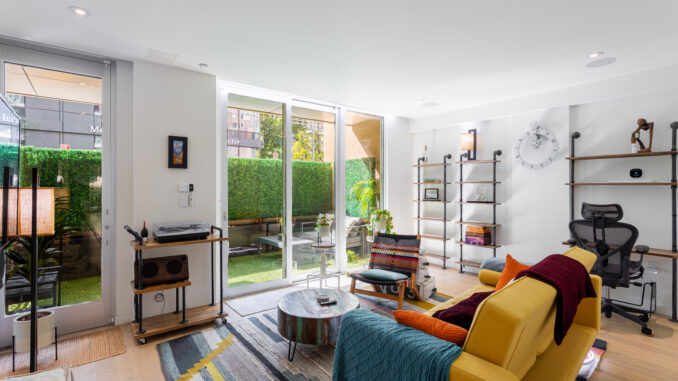
The furnished garden duplex at 337 E. 62nd St. in Lenox Hill — a unit now available for rent for a cool $18,000 a month — comes with plenty of amenities: outdoor space, a separate entrance and multiple high-tech “smart” features among them.
On the other hand, pets aren’t allowed. And neither are a few other things.
The 2,300-square-foot dwelling cannot be used for “any obscene performances,” as defined by the state’s penal code. Nor can the property be used for “obscene or pornographic purposes or activities.”
That’s because the 22-unit condominium building, constructed 10 years ago, was built on land sold by the Archdiocese of New York. The property traded for $7 million in early 2012.
The site was formerly occupied by a convent associated with the nearby Our Lady of Perpetual Help church. The church itself was razed in 1998.
Additionally, the premises must not be used for “any abortions or euthanasia proceedings,” or to provide “counseling or advice relating to abortions, birth control or euthanasia.” Any display of related signage is also prohibited.
Such use restrictions are not uncommon for deconsecrated churches and land sold by religious institutions.
“Faith communities can transfer title to their property but keep a non-possessory interest in its use,” said Rev. Patrick Reidy, an associate professor at Notre Dame Law School in Indiana, who studies religious property.
One striking example: The mixed-use skyscraper called One Chicago, recently built on the former parking lot of Holy Name Cathedral. The Archdiocese of Chicago sold the downtown parking lot in 2017 for an astronomical $110 million.
The developer agreed that the property would disallow any pawn shop, tattoo parlor, gambling facility, car wash, flea market or trailer park. Also prohibited are restaurants that encourage shirtlessness or the wearing of “provocative clothing” — including, but not limited to, hot pants and halter tops.
Restrictive religious covenants are enforceable in court should the local archdiocese choose to enforce them, Reidy told The Post. Still, “we don’t see a lot of litigation,” he said.
“Admittedly, cases involving religious covenants do not overwhelm the judiciary,” he and a colleague, Nicole Stelle Garnett, wrote in the Florida Law Review.
In fact, Reidy is not aware of any such enforcement actions.
“Use restrictions aim to control the activities of people who may not share the spiritual or moral commitments of their property’s prior owners,” the law review piece states.
“My concern would be that any property that is excessively restricted runs the risk of not being sellable,” Reidy said. “Just because most religious covenants are enforceable does not make them advisable.”
The spokesman for the Archdiocese of New York was in Rome for this month’s synod of bishops and was unavailable for comment.
The current owners of the duplex, Mollie and Pravir Chandra, who bought the unit four years ago for $2.3 million, found the restrictions curious but inconsequential.
“We knew that we weren’t going to upset any of those rules,” Mollie said. She is a licensed massage therapist, while her husband is a specialist in information security, currently working on a music startup using artificial intelligence.
The Chandras are leaving the city to start a bed and breakfast in picturesque Sayulita, Mexico, the beachy town that hosts “Bachelor in Paradise.”
The duplex for rent “feels like a house,” said the listing agent, Mariana Bekerman of Bond New York. Though it is partly below grade, “it doesn’t feel basement-y at all. It has floor-to-ceiling windows.”
It is, however, on a busy street, plagued with morning honking from traffic exiting the 59th Street Bridge.
The place, currently for rent for a minimum of six months, could be suitable for people needing a local place while they hunt for their own property to buy, the Chandras said. Or it could be a comfy spot for a patient being treated at a nearby hospital. The Chandras are also open to selling.
Pravir made the home smart. Temperature, lights, music — all are controlled via a phone app.
“You never have to touch a light switch,” he said. “You walk around and the lights will follow you.” The property has eight audio zones. The automated shades open and close on a schedule.
The downstairs game room holds gym equipment, hammock chairs and a surround-sound home theater with an 85-inch screen. “It’s like going to the movies,” Mollie said.
Outside, there is a layer of low-maintenance artificial grass, plus a gas grill and rotisserie. The yard is highlighted by an outcropping of Manhattan schist, the same bedrock found in Central Park. The Chandras affectionately call it their “church rock.”
The rock was the site of both proposal and marriage. “We kind of eloped in the backyard,” Mollie said.
Real Estate – Latest NYC, US & Celebrity News

